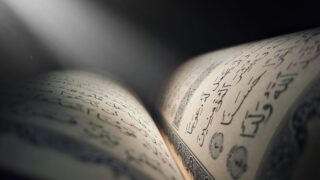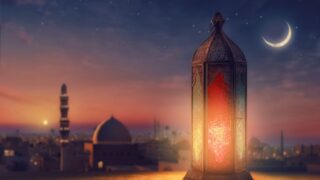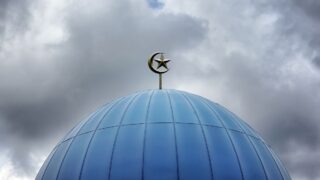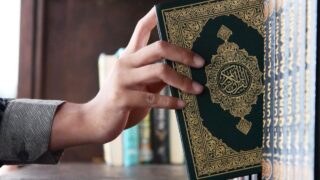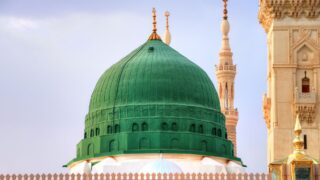Muslims believe that God created them to worship Him and lead a life of righteousness and piety. They also believe that Islam is not only about religious affairs. Islam is a complete way of life.
In their endeavors to lead their life, they, as humans, aspire to attain wealth, health, social position, etc.
It is not prohibited in Islam to seek a good job, a good social position, good health, … etc. The difference between Muslims and people of other faith communities is that Muslims are guided in every aspect of life by the teachings of both the Quran and the Sunnah (Prophetic tradition)
The Quran teaches Muslims to: {Seek instead, by means of what God has granted you, [the good of] the life to come, without forget¬ting, withal, your own [rightful] share in this world…} (28: 77)
The Prophet (peace be upon him) is reported to have said:
“Whoever wakes up safely in his home and is healthy in his body and has provisions for his day, would have acquired all the worldly possessions he is in need of.” (Al-Tirmidhi, 2346)
In what follows I will focus on explaining the meaning of this hadith.
The Prophet summarized the best world possessions which one could think of.
Feeling of Safety
The Arabic word “sirb” means, as the translation suggests, one’s home. It also means feeling safe among one’s family and relatives. This feeling of safety is very important. Lacking safety means that you are living an unstable life. Feeling safety is guaranteed when you do not harm others, or as the Prophet says:
“The Muslim is one from whose tongue and hand other Muslims are safe.” (Al-Bukhari, 11)
If you do not harm others, others will not harm you.
The meaning of safety is not limited to the literal meaning of feeling secure. The meaning is much wider. Safety means to be secure, to make others secure, to create safety, to be entrusted with safety and to have peace of mind. All these meanings are derived from the Arabic word Mu’min, a believer.
The feeling of safety is a gift from God that He bestows on those who worship Him. One of God’s favors on the people of Makkah was that:
{He gave them food against hunger, and made them safe from danger.} (106: 4)
Of Prophet’s Ibrahim’s prayer for the people of Makkah:
{O my Sustainer! Make this a land secure, and grant its people fruitful sustenance.} (2: 126)
Also Prophet Yusuf’s prayer for his parents to enter Egypt because it is a land of safety:
{And when they [all arrived in Egypt and] presented themselves before Joseph, he drew his parents unto himself, saying, “Enter Egypt! If God so wills, you shall be secure [from all evil]!} (12: 99)
Enjoying a Healthy Body
This is the second worldly possession. There are many prophetic guidelines on how to maintain good health. Seeking medicine is highly recommended in Islam when one falls ill. The Prophet said:
“God has not created a disease without creating a cure for it.” (Al-Bukhari, 5678)
Because our health is a gift from God, God has put much emphasis on the prohibition of drinking alcohol and eating pork for their possible harm on our health. Our responsibility is to avoid such prohibitions.
When we have a good health, we will be able to serve God in the best way. Therefore, it is very important to have this intention (serving God well) while eating and drinking. In this case, we will be rewarded greatly for things we do as a habit.
Moderation in eating and drinking is the key of good health. We should leave one third of the stomach empty.
God says in the Quran what means:
{O you who have attained to faith! Partake of the good things which We have provided for you as sustenance, and render thanks unto God, if it is [truly] Him that you worship.} (2: 172)
Therefore, consuming lawful food helps us build strong bodies so that we will be able to perform the rituals with concentration.
Practicing sports is very good for our health. The Prophet used to walk at a fast pace and race with his wife Aisha.
Islam made physical cleanness a condition for performing the five daily prayers. This is an indication of the importance attached to our health.
On the other hand, falling ill has a positive aspect in Islam. The Prophet said:
“No Muslim is afflicted with any harm, even if it were the prick of a thorn, but that God expiates his sins because of that, as a tree sheds its leaves.” (Al-Bukhari, 5640)
When you are sick, do not be sad. God will expiate your sins.
Having One Day Provision
This is a lesson for contentment. As long as you have the necessary food for one day, then do not worry about tomorrow. You do not know if you will live to witness it or not. Its knowledge is in God’s hand only. We read in the Quran what means:
{Verily, with God alone rests the knowledge of when the Last Hour will come: and He [it is who] sends down rain; and He [alone] knows what is in the wombs: whereas no one knows what he will reap tomorrow, and no one knows in what land he will die. Verily, God [alone] is all-knowing, all-aware.} (31: 34)
Do not think much of the future. Rest assured that you will not die before you receive all the provisions that God has ordained for you. The Prophet is reported to have said:
“No one will depart from this world until he takes all his provisions that are assigned to him…” (Muwatta Malik, 10)
One wonders about those who want to collect money as much as they can regardless of whether it is lawful or unlawful. They forget that they will be asked on the Day of Judgment about each penny they collected.
If we think deeply about this hadith, we will realize that this is what we need in this world. The Prophet was very careful in choosing his words as he sums up the elements of happiness and makes them only three worldly possessions which have been explained above.
We pray to God to make us content with what we have, enjoy a good health and have provision for one day.
By Mohsen Haredy


